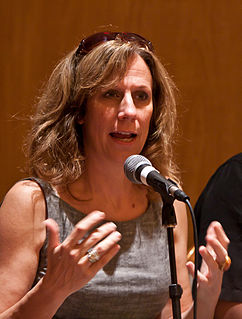A Quote by Loretta Chase
Let me explain something to you, he said. If you want to get something out of a man, dashing out his brains against a lamppost isn't the way to do it.
Related Quotes
Unless you can point to something that I have done or said that has changed the course of the public opinion in a negative way, you've got to check yourself sometimes and say, "Maybe I don't like the way that this thing is said, but it's expanding tolerance." If I said something that was shutting down something that was positive, call me out, but I don't really see me doing that.
He misses the feeling of creating something out of something. That’s right — something out of something. Because something out of nothing is when you make something up out of thin air, in which case it has no value. Anybody can do that. But something out of something means it was really there the whole time, inside you, and you discover it as part of something new, that’s never happened before.
He is not easy to describe. There is something wrong with his appearance; something displeasing, something downright detestable. I never saw a man I so disliked, and yet I scarce know why. He must be deformed somewhere; he gives a strong feeling of deformity, although I couldn’t specify the point. He’s an extraordinary-looking man, and yet I really can name nothing out of the way. No sir; I can make no hand of it; I can’t describe him. And it’s not want of memory; for I declare I can see him this moment.
The men who go out the scientists who go out, they have so much fun on the way that when they get there well it's done. So they're looking for another thing. You see the objective may remain the same - the search - but you must get lost on the way, get stupid to my mind, this is what you do in theatre; a team of people go out to look for something, they find, maybe, something else.
I feel like people have more in common than the news reports. People getting along doesn't sell very well in the news. I find that to be deeply depressing. I don't even talk about it on stage, because it would take too long to explain. I'd have to spend an hour on it to get people to understand what I'm saying because it's so instantly polarizing. Because cable news has kind of set up a construct where you're for or against something immediately. So if I said something about it, people would be for or against me immediately. And I don't want that.
And my dad's answer would be usually something to the affect of, A, it came out better than he imagined, but also, he said, "No, it would be impossible for me to imagine the way it will come out." He said, "Yes, I story-boarded it, I had a plan, but then I work with an army of great artists and I want all of them to create inside that creation."
I met [ Samuel L. Jackson ] for the first time on The Today Show. He came out of an elevator. I was promoting A Mighty Wind and he was promoting something else. He said, "I hear we're going to be working together." I said, "On what?" He said, 'The Man.' I hadn't heard his name mentioned before. I made a few calls and found out he had the script and was interested. That was it.
Say something in Mandarin,” said Tessa, with a smile. Jem said something that sounded like a lot of breathy vowels and consonants run together, his voice rising and falling melodically: “Ni hen piao liang.” “What did you say?” Tessa was curious. “I said your hair is coming undone — here,” he said, and reached out and tucked an escaping curl back behind her ear. Tessa felt the blood spill hot up into her face, and was glad for the dimness of the carriage. “You have to be careful with it,” he said, taking his hand back, slowly, his fingers lingering against her cheek.






































